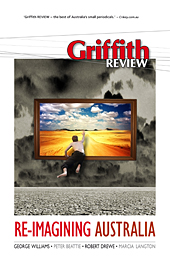Featured in

Buy
$19.95
- Published 20080603
- ISBN: 9780733322815
- Extent: 272 pp
- Paperback (234 x 153mm)

Already a subscriber? Sign in here
If you are an educator or student wishing to access content for study purposes please contact us at griffithreview@griffith.edu.au
Share article
More from author

Exploring the historical imagination
EssayIT HAS BEEN said of George Macaulay Trevelyan that he was gifted with a 'vivid pictorial sense'. True enough, but consider for instance an...
More from this edition

First define, then see and act
IntroductionTHE EXISTENCE OF of a vast landmass at the bottom of the southern hemisphere had entered European consciousness – like unseen creatures in the...

A letter to my father
MemoirDEAR NEVILLE,I know you weren't that keen on poetry – apart from Henry Lawson's ‘Faces in the Street'– but here's a short poem I...

Clean, orderly and laminex coloured
EssayWHAT DOES AUSTRALIA look like? In the 1950s a school-aged Hilary McPhee, in an essay on what Australia would be like in 2000, foresaw...
Stay up to date with the latest, news, articles and special offers from Griffith Review.